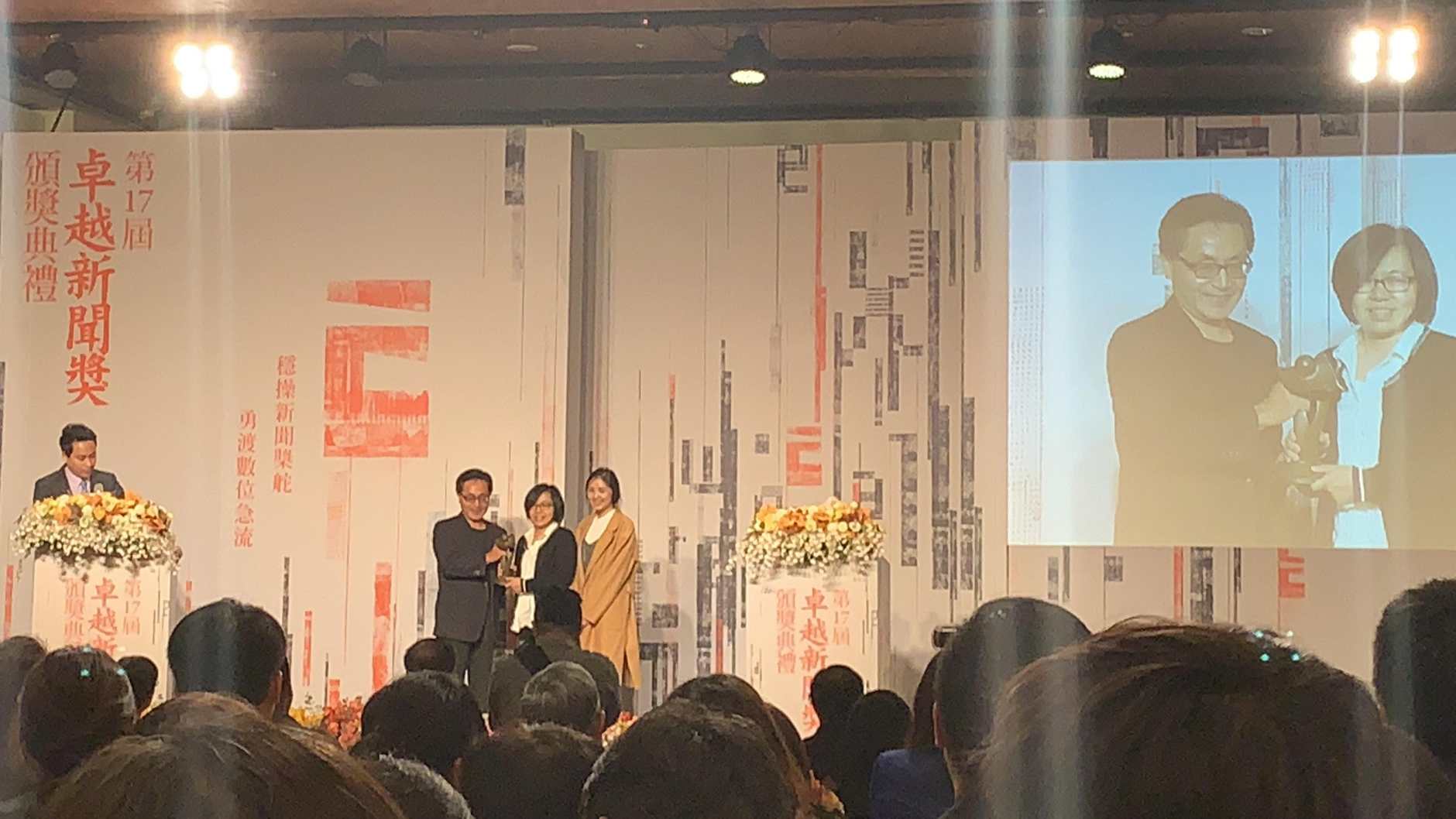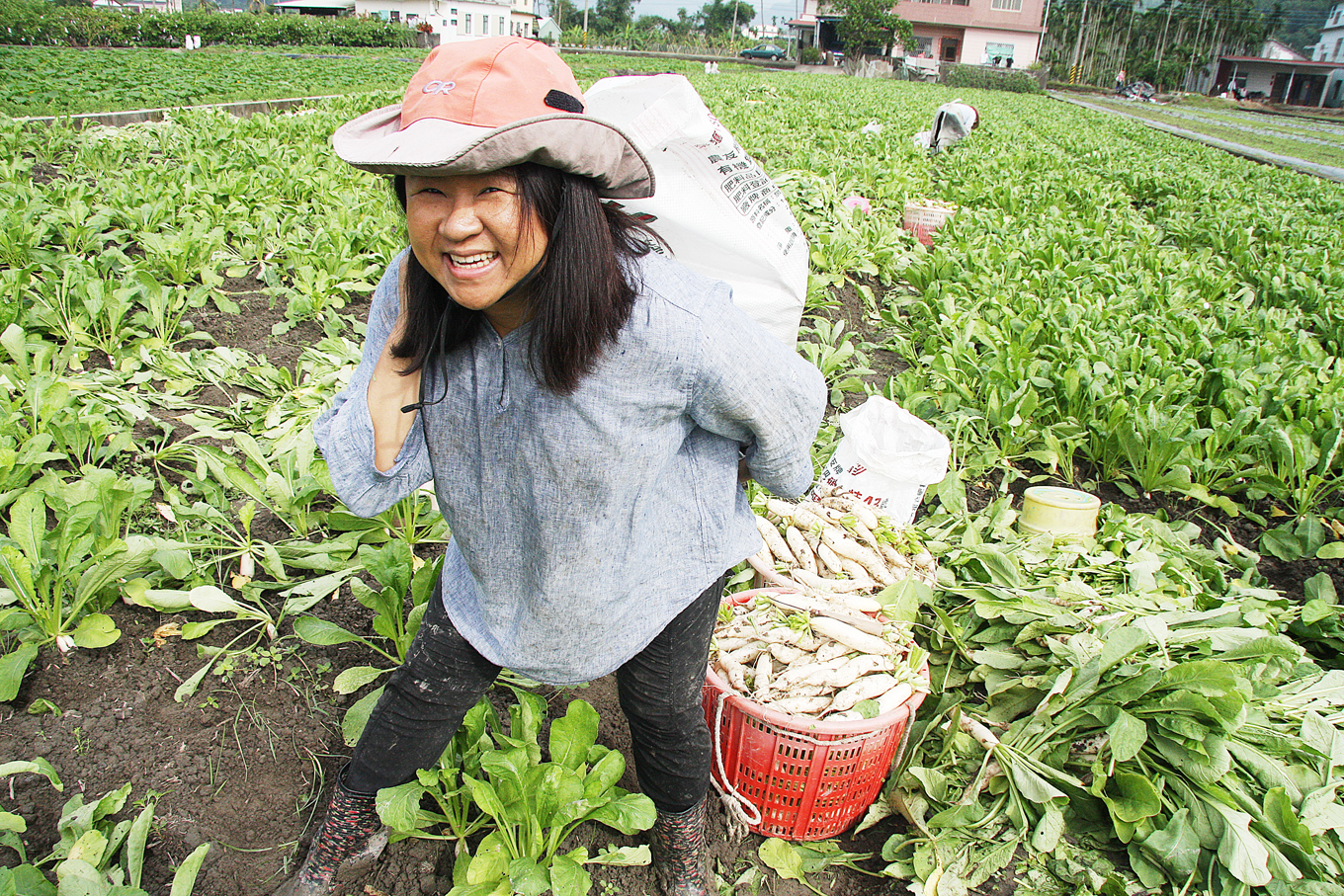Thanks to everyone who stayed in the countryside, │ "upstream and downstream" won the 2018 Outstanding Journalism Award and the instant news award.
Share560 + 1 Tweet EmailShares 560
"upstream and downstream" was shortlisted for three outstanding journalism awards in 2018, and finally won this year's instant news award for "Beinong Taipei Fruit and vegetable Market closed Storm Series". We feel very honored and grateful to win the most important news award in China.
Looking back in March this year, Li Huiyi, a reporter stationed in rural areas, exclusively exposed the agricultural shock caused by Beinongxiu. in the face of this incident, "upstream and downstream" did not see any appetite for joy, and we were very worried about this crisis. We also hope that while releasing the news, we can also solve the problem as soon as possible and reduce the damage to farmers and the auction market. Unfortunately, later events got out of hand, especially in the political ferment, which made "Bei Nong" the most important word in the news throughout 2018.
This year is the 45th year since the founding of Bei Nong, and it is also the first time that Bei Nong has been so highly concerned or even magnified by the society. Taiwan society has also begun to find that "the countryside is so close to the city" and "the future of the countryside is closely related to the future of the city". It is hoped that the awards won by the upstream and downstream can remind Taiwan society that the relationship between the countryside and the city is inseparable, while the north farmer plays the role of the largest auction market in Taiwan. What's more, we have an incomparable responsibility to take into account both agricultural development and the rights and interests of consumers.
The series of reports on "Beinongxiu City" were jointly completed by reporters Li Huiyi, Liu Yixin and Lai Yuwei. Here are some feelings that reporter Li Huiyi would like to share with you.


After marrying into the countryside, Li Huiyi, who is also a journalist, rural wife and mother (Photo / Zeng Hongzhi)
Working in the media for 20 years, agricultural issues have been ignored for a long time.
I majored in politics in college and have always been highly interested in public affairs, but after the September 21 earthquake in 1999, I decided to leave politics and join the media. During this period, after 17 years of public television service, after leaving office in April 2016, I became a freelance journalist of half agriculture and half X, joined the "upstream and downstream" news team in charge of southern missions, and worked regularly with PTV's "our Island".
During the period of public TV service, it was the most important day of my life. I would come into contact with agricultural issues, mainly because of the continuous support and encouragement of my producer and good friend Yu Liping. It was only then that I dared to give up everything about Tianlong Kingdom and go to the southern town of Meinong for a long-term interview. This year is 2006.
In December 2008, the Legislative Yuan passed the regulations on Rural Regeneration on first reading, which is likely to have a major impact on rural areas with regard to the conditions for land use change and the orientation of rural garden landscaping. So I produced an one-hour series of reports, "the Game of Life in the Countryside", and won the "Mr. Zeng Xubai Public Service reporting Award" for public television in 2009.
Looking back at that time, agricultural issues were not at all popular in the news circle, let alone on an equal footing with political lines, financial lines, sports lines, and so on. I was very impressed. When I ran the news in the south and returned to Taipei for post-production, I often met my colleagues in other groups who would smile and ask me, "this time I went out to shoot rural music again!"
In rural areas, this is the impression on ordinary people, but I, who have lived in rural areas for a long time, know very well that this is not the case, especially when I settled in Meinung after marriage in 2009. I even feel that the current situation of agriculture has a direct impact on the food security of urban people, the land use of the whole country, and the sustainable health of the natural ecological environment, but why Taiwan society has no feeling for rural areas, no knowledge of agriculture, and only sympathy for farmers. Obviously, most Taiwanese come from the countryside.
Often ask yourself, "how are you in the countryside?"
In December 2016, I wrote a book called "how are you in the countryside?" The preface reads: "the silent tsunami, sweeping the countryside, has never slowed down." Including fully cemented water banks, land sprinkled with pesticides, fertilizers and herbicides, mountain slopes ravaged by grotesque lynx reclamation, over-sightseeing or de-contextualization of cultural creation and experience activities, young adults who cannot leave their homes or cannot return to their villages, the elderly living alone in the courtyard and the old farmers trapped in Zutian, the agricultural and industrial system of women fighting alone, the lack of resources for infant and child care and children's education, the disintegration of family order and the invasion of drugs, The loss of local languages and traditional values ⋯⋯"
"and in my own little world, the dark tide is also rolling up thousands of piles of snow. The differences between the southern and northern accents suggest that I am a northern guest and the threshold for me to become a local; the job adjustment of child-rearing without pay means that I have lost my independent economic ability; and the friendly environmental agricultural law and the attempt to sell myself have once again made the production mode of my mother-in-law face the challenge of manpower restructuring and the transformation of dominant power. Of course, there are also doubts and accusations of following others and whispering in the traditional rural areas. Not to mention the birth of two children one after another, I was surrounded and trapped by washing clothes, washing dishes, cleaning at home, changing diapers, breast-feeding, the division of family work between husband and wife, and the quarrels, screams and cries of the children. "
"external and internal challenges are surging into the second half of my life. The city friends asked doubtfully, 'are you all right?' I usually smile and take it easy. Because I have more question marks in my heart, to sum up, 'how are you in the countryside?' "
Up to now, these self-preface words still beat my heart from time to time.
Agriculture needs to adjust its physique. Thank everyone who stays in the countryside.
Winning an award, like an election, is a temporary thing, and there are still important things to go back to the day-to-day. The "three rural issues" such as rural areas, agriculture and farmers are gradually valued and discussed by the society, which we think is the most important thing.
Taiwan's agriculture has been restricted by national policy for a long time, from the early rice cultivation can only be sold to the government at a low price, and the state was allowed to go out to exchange foreign exchange, until agricultural land, mountain forests and water sources were regarded as resources for economic development, and the country could take whatever it wanted. And because the long-term economic structure is skewed towards industrial exports, driving down the prices of agricultural products in order to maintain a low-wage labor structure, just as the two major shareholders of North Peasants, the ── Council of Agriculture and the Taipei City Government, should give priority to safeguarding the interests of the producing areas, or should they stabilize the prices of vegetables to avoid political fluctuations? Has not been able to achieve a balance.
Under the unequal development structure, in order to appease rural grievances, the state continues to offer small benefits through subsidies or cash assistance, resulting in over-reliance on the government in agriculture and even the development of a strong gambling industrial character, from bananas to cabbage. Price fluctuations occur year after year. When can Taiwan's rural areas walk out of the road of self-reliance and self-improvement? We need to think about it together.
Finally, I would like to express my special thanks to everyone who stayed in the countryside. I would like to thank the farmers for feeding you and helping you protect this piece of land in Taiwan. Thank you to the other two partners, Yu Wei and Yixin. Fortunately, this series of news is complete with you guarding the scene of Bei Nong.
"upstream and downstream", an independent media growing from the countryside! Come on, everybody.
"A series of reports on the storm in Taipei Fruit and vegetable Market of Bei Nong"
End the banana bet! The predicament and Future of Canna Industry in Taiwan
Onion price ups and downs, production, marketing and warehousing regulation failure? How to master the access and the number of seedlings to stabilize the market?
How to play this game of cabbage? Win the lottery, win the lottery, win the lottery,
Share560 + 1 Tweet EmailShares 560
- Prev

Chiayi County's high-quality agricultural and fishery products will be delivered directly to Taipei Hope Square on December 1-2
The Chiayi County government will hold Chiayi Week activities on December 1-2 at Taipei Hope Square to market and display high-quality agricultural and fishery products. Famous chefs will be on site...
- Next

Taobo Pavilion in New Taipei City has been celebrating for three weeks.
Do you remember how the 18th birthday was reveled? Taobo Museum of New Taipei City is also 18 years old this year! In order to allow people who have supported ceramic art for many years to participate in this grand event, there are all kinds of eating, drinking and merrymaking in the museum celebration for three weeks. Welcome to wish Tao.
Related
- A course of planting techniques and methods on how to grow carrots
- How to plant the latest tulips?
- Is it better to pick tea in the morning or in the afternoon? When is the best time for tea to be picked? what is the third or fifth tea?
- Launch Yuanxiao Happy combination Haocha + Tea Yuan healthy Taste
- Penghu Tourism "Fireworks 20 Parade with You"
- 2022 West Lake Happiness holds "Digital Revitalization Voucher" and draws iphone13 and laptop.
- Banqiao Fuzhou social houses are designed to change start-up combined with police elimination to create a safe and livable environment
- The convenient measure of "mechanical weeding" in Xinbei has been abused and the Agriculture Bureau has imposed heavy penalties on the illegal land consolidation.
- Changgeng University Joins Hands with Four Memory Factories to Rescue Memory Talent Shortage
- The list of Taiwan's top 100 MVP managers is listed by the Director-General of the Farmers' Association of Sanxia District.

